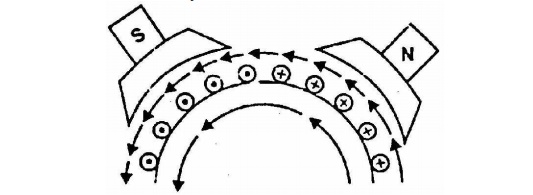Chapter: Electrical machines : DC Motor
Working of D.C. Motor
Working
of D.C. Motor
When the terminals of the motor are connected to an external source of d.c. supply:
(i)
the field magnets are excited developing alternate
N and S poles;
(ii)
the armature conductors carry currents.

All
conductors under N-pole carry currents in one direction while all the
conductors under S-pole carry currents in the opposite direction. Suppose the
conductors under N-pole carry currents into the plane of the paper and those
under S-pole carry currents out of the plane of the paper as shown in Fig.
Since each armature conductor is carrying current and is placed in the magnetic
field, mechanical force acts on it.
Applying
Fleming’s left hand rule, it is clear that force on each conductor is tending
to rotate the armature in anticlockwise direction. All these forces add
together to produce a driving torque which sets the armature rotating. When the
conductor moves from one side of a brush to the other, the current in that
conductor is reversed and at the same time it comes under the influence of next
pole which is of opposite polarity. Consequently, the direction of force on the
conductor remains the same.
Related Topics